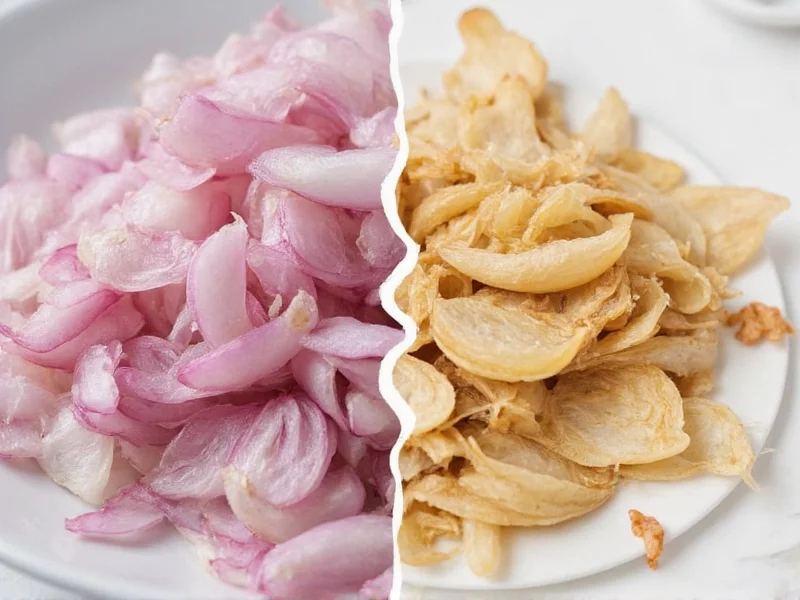The standard conversion ratio is: 1 tablespoon of dried onion equals 1 medium fresh onion. For more precise measurements, 3 tablespoons of dried minced onion equals 1 cup of fresh chopped onion, and 1 teaspoon of onion powder equals 1/2 cup of fresh chopped onion. These ratios account for the moisture difference between dried and fresh forms.
Understanding Dried Onion to Fresh Onion Conversion
When adapting recipes, knowing the proper dried onion to fresh onion conversion is essential for maintaining flavor balance. Many home cooks face this dilemma when a recipe calls for fresh onions but they only have dried onion available, or vice versa. Getting this substitution wrong can dramatically alter your dish's taste profile and texture.
The Science Behind Onion Substitutions
Dried onions undergo a dehydration process that removes approximately 89% of their water content. This concentration means dried forms pack more intense flavor in smaller volumes. Fresh onions contain about 89% water, while dried onion products contain only 5-7% moisture. This fundamental difference explains why you need less dried product to achieve similar flavor intensity.
Precise Conversion Measurements
For accurate recipe adaptation, use these specific measurements:
| Dried Onion Form | Equivalent to 1 Cup Fresh Chopped Onion | Equivalent to 1 Medium Fresh Onion |
|---|---|---|
| Dried minced onion | 3 tablespoons | 1 tablespoon |
| Onion flakes | 1/4 cup | 1.5 tablespoons |
| Onion powder | 2 tablespoons | 2 teaspoons |
Flavor Differences You Should Know
While these conversions provide volume equivalence, the flavor profiles differ significantly. Fresh onions offer sharp, pungent notes with natural sweetness that develops when cooked. Dried onions provide more concentrated, earthy flavor with less complexity. Onion powder delivers the most intense flavor but lacks the textural element of fresh or dried minced onion.
When substituting dried for fresh, consider adding 1-2 teaspoons of water or broth to compensate for the missing moisture, especially in dishes like casseroles or meatloaf where texture matters.
Best Practices for Onion Substitutions
Certain cooking applications handle substitutions better than others. For sautéed dishes, soups, and stews, dried onion works well as a fresh onion substitute. Simply rehydrate dried minced onion by soaking in warm water for 10-15 minutes before use. For salads, salsas, or garnishes where texture matters, fresh onion remains irreplaceable.
When using onion powder as a substitute, reduce the amount by half compared to dried minced onion, as its flavor is more concentrated. Always add dried onion products early in the cooking process to allow full rehydration and flavor development.
Common Mistakes to Avoid
Many home cooks make these errors when substituting dried for fresh onion:
- Using equal volumes (1:1 ratio) without accounting for concentration
- Adding dried onion too late in the cooking process
- Not adjusting liquid content in recipes
- Using onion powder in applications requiring texture
- Substituting in raw applications like salads
When Substitutions Don't Work
Some recipes simply won't work with substitutions. Avoid replacing fresh onions with dried versions in:
- Fresh salsas and pico de gallo
- Ceviche and other raw preparations
- Grilled onion recipes
- Onion rings and fried onion dishes
- Recipes specifically highlighting fresh onion texture
Pro Tips for Perfect Onion Substitutions
For the best results when converting between dried and fresh onion:
- Rehydrate dried minced onion in vegetable broth instead of water for enhanced flavor
- When using onion powder, mix with a small amount of oil to distribute flavor evenly
- For baked goods, use dehydrated onion flakes which provide better texture
- Adjust seasoning after adding dried onion, as salt content varies by brand
- Store dried onion products in airtight containers away from light and heat
Understanding Onion Product Variations
Not all dried onion products are created equal. Commercial dried onions may contain anti-caking agents or varying moisture levels. Premium brands often retain more flavor compounds during dehydration. When precision matters, like in professional recipe development, test your specific brand's conversion ratio by comparing small samples side by side.
Final Thoughts on Onion Conversions
Mastering the dried onion to fresh onion conversion ratio empowers you to adapt recipes confidently. Remember that 1 tablespoon of dried minced onion equals one medium fresh onion as your baseline conversion. Adjust based on your specific recipe needs, considering both volume and flavor intensity. With practice, you'll develop an intuitive sense for when and how to substitute these versatile alliums.
Can I use onion powder instead of fresh onion in meatloaf?
Yes, use 2 teaspoons of onion powder per medium fresh onion called for in your meatloaf recipe. For best results, mix the powder with the wet ingredients to ensure even distribution and rehydration during cooking.
How do I substitute dried onion for fresh in soup?
For soups, use 1 tablespoon of dried minced onion per medium fresh onion. Add the dried onion early in the cooking process and consider increasing liquid by 2-3 tablespoons to compensate for the missing moisture from fresh onions.
Does the conversion differ for red versus yellow onions?
The conversion ratio remains the same regardless of onion variety. However, flavor intensity varies - red onions are milder, so you might use slightly more dried red onion than yellow when substituting in raw applications, but the volume conversion stays consistent.
Why does my dish taste too strong when I substitute dried onion?
This happens when using equal volumes instead of proper conversion ratios. Dried onion is more concentrated, so using 1:1 measurements creates overpowering flavor. Always use the 3:1 ratio (3 tablespoons dried = 1 cup fresh) and adjust to taste after cooking.
How long do dried onions last compared to fresh?
Properly stored in an airtight container away from light and moisture, dried onions maintain quality for 12-18 months. Fresh onions last 1-2 months in cool, dark storage. The extended shelf life of dried onions makes them valuable pantry staples for quick substitutions.











 浙公网安备
33010002000092号
浙公网安备
33010002000092号 浙B2-20120091-4
浙B2-20120091-4